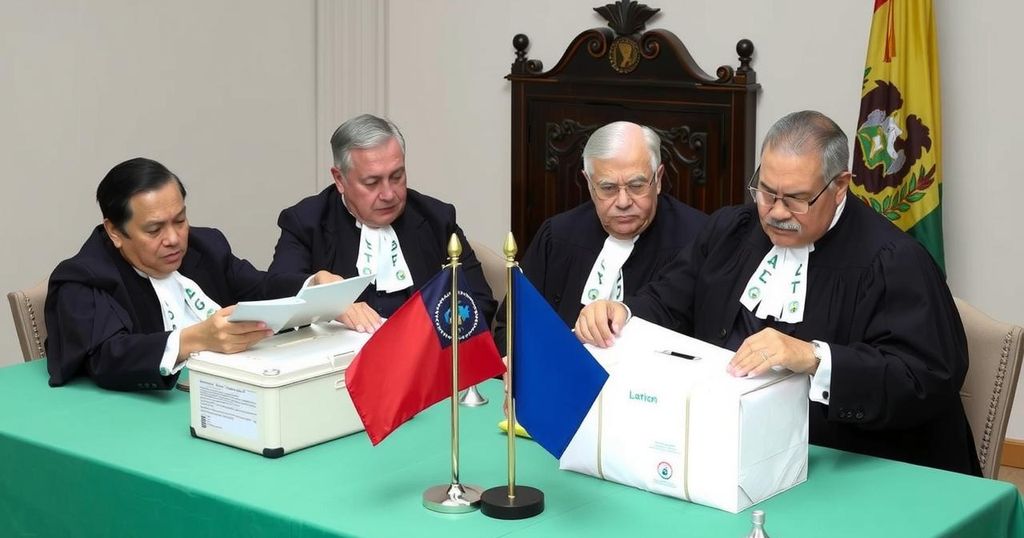On Sunday, Bolivia will hold judicial elections to select four out of nine Constitutional Court judges amidst widespread skepticism over the electoral process. The elections follow a controversial postponement, reflecting deeper political struggles and public disillusionment with the judiciary’s role. As the only country that elects its top judges, Bolivia’s approach faces criticism for politicization and undermining democratic principles, prompting concerns both domestically and internationally.
In Bolivia, the judicial elections scheduled for Sunday are generating considerable controversy and skepticism among voters. Despite the prohibition on campaigning for these positions, some candidates have cleverly utilized unconventional methods to raise their visibility. This election will determine four out of the nine judges on Bolivia’s Constitutional Court, yet the electoral process has come under scrutiny for its potential to deepen political strife and compromise judicial independence. The decision to delay these elections has added further complications, leading to fears that the judiciary has become a political tool rather than a fair arbiter of justice. Concerns voiced by both citizens and officials signal a broader crisis of confidence in Bolivia’s electoral system, which relies on populism rather than qualifications in the selection of judges.
The inherent structure of Bolivia’s judicial elections, implemented over a decade ago, has increasingly drawn criticism not only from domestic observers but also from international experts. The politicization of the judiciary is seen as a systemic threat to democracy throughout Latin America, where judicial independence plays a vital role in maintaining checks and balances. Key figures within the judicial community have expressed concerns regarding the deterioration of the election process, which has transformed the election of judges into a contentious undertaking marked by controversy.
The political motivations underlying the delay in judicial elections are particularly telling. Following internal conflicts within the ruling party, President Luis Arce’s allies on the Constitutional Court postponed the elections, reflecting a power struggle with former President Evo Morales. This manipulation could enhance Arce’s political stability by maintaining control over vital court seats. Critics have pointed out that the postponement undermines the credibility of Bolivia’s legal system and may erode public trust in the judiciary. Critics have further highlighted how this election, while necessary, may only perpetuate existing issues rather than resolve them.
Furthermore, the current context marks a pivotal moment in Bolivia’s governance. Past judicial elections in 2011 and 2017 had disappointing voter engagement, as many citizens expressed distrust in a system that neither engaged them nor offered transparency in candidate selection. The recent decision by the Constitutional Court to become an influential actor in political affairs has led to public outcry, echoing past controversies surrounding electoral legitimacy. Following Morales’ controversial attempts to extend his presidency against popular sentiment, the implications of this election could reshape Bolivia’s political landscape.
In conclusion, the upcoming judicial elections in Bolivia symbolize a broader struggle over the balance of power and democratic integrity. The controversial postponement of elections, combined with increasing public disillusionment, raises serious questions about the future of judicial impartiality. As citizens prepare to cast votes for judges whose qualifications remain largely unknown, the potential ramifications for Bolivia’s democratic framework emerge as a pressing concern that may resonate well beyond its borders.
Bolivia’s unique system of electing top judges has sparked critical discussions about the intersection of democracy and political influence. As the only country globally that utilizes such a methodology, Bolivia’s experiences have implications for other countries considering similar reforms. Former President Evo Morales initiated this electoral framework to dismantle corruption within the judiciary; however, this transformation has led to politicization and reduced faith in judicial impartiality. As Bolivia navigates various political challenges, including internal conflicts within its ruling party, the methodologies and outcomes of its elections garner significant attention from both local and international stakeholders.
The impending judicial elections in Bolivia raise critical concerns about the state of democracy and the judiciary’s role in governance. The electoral process faces substantial skepticism from citizens and experts alike, specifically regarding its effectiveness and the risk of increasing political strife. This election serves as a crucial indicator of Bolivia’s political trajectory and the potential evolution or degradation of judicial integrity in the country.
Original Source: www.voanews.com






